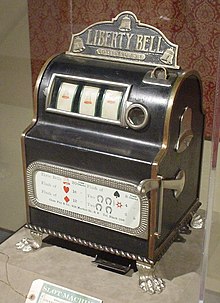How Do Video Slot Machines Work
Owning a vintage slot machine is one of those fun yet daunting ideas. Many old school one-armed bandits are beautifully designed and instant conversation pieces. Plus slot fans who own a machine don’t ever have to worry about losing money to the house.
Choosing slot machines that have more than one bonus round for better chances at winning and collecting payouts. Make sure to compare the pay tables with progressive slots as these games often pay less for the base game than standard video slot machines. Illinois slot games are developed specifically for the Illinois gaming market, but many of the same gaming titles can be found in casinos. Upright slot machines are approximately 2.5' wide x 2’ deep x 5’ tall. Slant top slot machines vary in size. 2 x 20 amp breakers @ 120 volts power all 5 slot machines and the cash redemption machine. The two slots machines operate differently. The Class II slot machines are common in slots parlors. They are attached to Native American Casinos or horse racing tracks. Owing to improved tech tools, Class II slot machines have become more sophisticated. So much so that casual punters have a hard time telling them apart from Class III slot machines.
Charles August Fey, a Bavaria-born inventor, was living in San Francisco when he invented his first gambling machine in 1984. His games grew to be so popular at local bars, he quit his day job and opened a factory to start mass producing them, most notably the Liberty Bell machines in 1899. A lot of the functionality from that early game remained in place through much of the 20th century. Watch this video to see the seven mechanical actions set into motion when you pull back the bandit’s arm. The inner workings are probably a little more complex than you expect.
Given that a lot of old slot machines are hand built, it isn’t surprising that coins can get jammed on their way through the mechanism. Big warning: If your machine jams, don’t force the arm or you can break, twist or damage a part inside. Different models and makes tend to have common jam points. The Mills model shown in the above video can have coins stuck in the “elevator” section that displays the last five coins dropped into the machine. Getting the slot working again can be as simple as cleaning the gunk off of an old part. You just need to be smart when you’re disassembling and reassembling the machinery.
How Do Slots Machines Work
Okay, there are plenty of more places where a coin can get stuck and the above video demonstrates how to fix a variety of jams. It also explains how to disassemble the major parts of the machine and where common problem areas are.
Curious how an antique slot machine knows how much money a winner gets? This video shows the punch-card like communication that trips payouts and how. If you ever need to replace the reel symbols or calibrate the machine you’ll need to understand how these work. Even if you don’t ever plan on owning a machine, the metallic “circuitry” is interesting to see.
Want to own a modern slot machine? New ones have plenty more bells, whistles and dings, and also a lot more advanced parts. If you plan on getting one, you may want to have an idea of what’s inside. In addition to the classic reels, there are speakers, motherboards filled with programming chips and plenty of wires. Unless you have a way with a soldering iron you probably won’t try and fix it. But in case you do, here’s a clip from Discovery showing what’s inside.
Did you know newer slot machines are smart enough to test themselves when a problem happens? This video shows you the procedure for having the machine check its own system. The host’s desert dry delivery is also enough to make this vid worth a watch.
Slots are among the most popular ways to gamble. It’s easy to sit down, put your money in, and watch the reels spin. But there’s more going on than you might expect. Let’s take a look inside to understand what’s happening when you pull the lever.
Slot machines generally have three or more “reels,” each of which has a number of symbols. While physical slot machines may have 20 or more symbols per reel, digital technology allows them to have many more—some have 256 virtual symbols—with millions of possible combinations. The combinations of symbols that pay out if you bet on them are called “paylines.”
Slot machines contain random number generators that can generate thousands of numbers per second, each of which is associated with a different combination of symbols. Whether you win or lose is determined by the random number generated in the exact instant you activate each play—if it matches a payline, you win. Since each spin is independent, random and unrelated to previous or future spins, it’s impossible to predict what will happen on each play.
There are many different kinds of slot machines. Some allow you to choose how many paylines to bet on per play, and how much you want to bet. Before you put your money in, figure out the cost per play, the odds, the paylines, the return to player, and anything else that will help you make the right decisions for you. Look for pay tables on or near the machine that explain everything you need to know.
The possible payouts and the odds of winning depend on the machine you’re playing, the paylines you choose to play, and how many credits you wager.
Machines that cost pennies to play might pay out small prizes relatively often. Others cost several dollars per play, but offer bigger jackpots and higher odds. For instance, for the I Heart Triple Diamond penny machine, the odds of winning a prize are 1 in 12, but the odds of winning the top prize are only 1 in 649,400.
No matter what machine you decide to play, the odds always favour the house. This means that over time, it’s more likely than not that you will walk away with less money than when you started.
While machines can be programmed to pay out at higher or lower odds, a typical average house advantage for slot machines is 8%, meaning the average return the player is 92 percent. That makes slot machines less favourable than tables games such as fortune pai gow poker, blackjack and roulette, in terms of return to player.
| Game | House advantage, with optimal play |
|---|---|
| Baccarat | 1.06% |
| Blackjack | 0.5% |
| Craps | 0.8% |
| Fortune pai gow poker | 0.5 to 2.5% |
| Poker | 2 to 3.5% |
| Lottery | 50% |
| Roulette | 5.3% |
| Slot machines | 8% (average) |
Playing longer doesn’t improve your odds of walking away a winner.
Persistence doesn’t pay off. Each play on a slot machine is independent, unpredictable and unrelated to what happened on the previous play. A machine is never “due for a win” and they don’t “go cold” after a win either.
Soon after you leave a machine it wins a jackpot—that doesn’t mean you would have won if you had kept playing.
Future wins on a machine are completely unrelated to what happened when you were playing. Because random number generators determine the outcome of each play, the results of each play are totally independent from what happened before. Outcomes depend on what random number is generated in the exact instant a player presses play or pulls the lever.
Machines that are furthest from the aisle do not pay out more because they’re played less often.
How often a machine is played has nothing to do with how likely it is to pay out on the next play. Payouts are determined by the pre-set odds of the machine and the unpredictable results of the random number generator inside.
You cannot improve your chances of winning at most slot machines.
How Do Video Slot Machines Work Without
Most slots are games of chance, based on the random number generator. For some machines, bonus games offer you a chance to influence the outcome by interacting with an arcade-style video game. While skill may be a factor, the random number generator usually determines whether you even get to play the bonus game and the amounts available to be won—so chance is still a major part of the deal.
Understand how skill and chance work and how they affect the games you play.
Read this

Take this quiz to get a better understanding of your gambling habits.
Read thisUnderstand the role randomness plays in games of skill and how it affects the outcome of the game.
How Slot Machines Work Video
 Read this
Read this